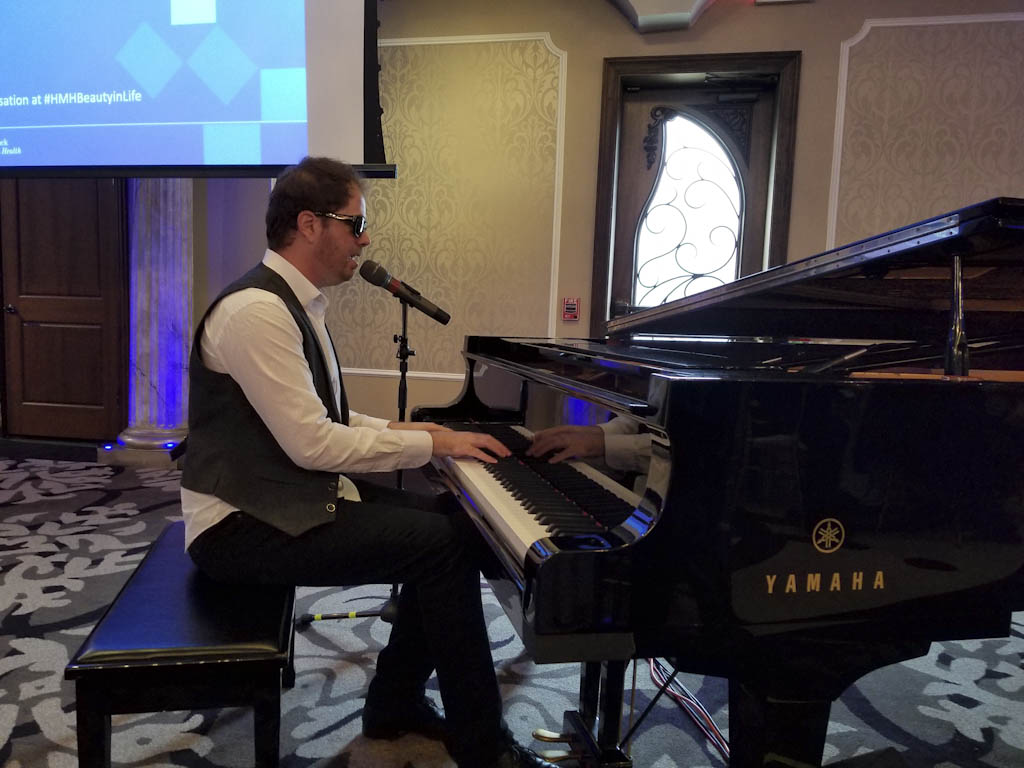OLD BRIDGE — When Scott MacIntyre was five years old, he had a vivid dream of performing at the piano inside an arena.
Little did he know, his subconscious was foreseeing what was to come — MacIntyre, 32, became the first blind finalist on season 8 of American Idol in 2009. American Idol is an American singing competition television series that has launched the careers of singers Kelly Clarkson, Carrie Underwood and Jennifer Hudson. The judges were Paula Abdul, Simon Cowell and Randy Jackson at the time.
MacIntyre, now an acclaimed speaker, sing-songwriter, scholar and author, was the keynote speaker during Hackensack Meridian Health’s (HMH) Mitchell Vassar Vision Awareness Day “The Beauty in Life: Living with a Chronic Medical Condition.” The event, which included a luncheon and resource fair with exhibitions from an array of HMH network services and programs, was held on Nov. 30 held at the Grand Marquis.
The American Idol finalist shared three principles that have helped and continue to help carry him through his life journey in hopes he can inspire people through their own adversities.
At 19 years old, he was diagnosed with stage-four kidney failure, but received a transplant that saved his life. Less than a year later, he ended up on one of the biggest stages in the world – American Idol. As the first blind finalist on the show, he has inspired audiences on overcoming adversity, motivation, and the importance of education.
“Success starts with a choice,” MacIntyre said.
Born blind and now a two time kidney transplant recipient, MacIntyre knows what it means to persevere despite seemingly insurmountable obstacles.
“I have a tiny bit of vision, which I describe as looking through a coffee straw or the size of a mouse cursor on a computer screen,” he said.
MacIntyre said early on he had to make a choice and not get caught up in what he couldn’t do, which can lead people down the road of frustration, anger and bitterness.
“I had to focus on the things that I can do,” he said. “I had no eyes, but I had ears and music became a big part of my life.”
The second principle MacIntyre said he has taken — he does not have to see where he is going in order to reach his goals.
He said he switched the phrase “seeing is believing” to “believing is seeing.”
MacIntyre said his music journey started with piano lessons and with a teacher who believed in him.
He recalled that he was working on a Ludwig van Beethoven Sonata, which required him to jump across the keys.
“Being blind, I would feel my way like a spider crawling to get to the key,” MacIntyre said. “However, it’s not visually appealing [when playing the piano]. So as I continued to work on the piece, my teacher said “Scott, I don’t want you to feel the keys anymore” and motioned what he wanted me to do.”
MacIntyre said he was taken aback because his teacher’s request took him out of his comfort zone.
“It was kind of like he was telling me to take a leap of faith,” he said noting that his first leap of faith to the keys across the piano was a major fail.
However, with every leap of faith, MacIntyre began to hit the right keys and gain confidence in his abilities.
“My teacher’s belief in me planted the seed of belief I needed,” he said.
At 14 years old, MacIntyre was admitted into Arizona State University’s Barrett Honors College and Herberger College of Fine Arts. He received a master’s degree overseas in England at Royal Holloway, University of London and the Royal College of Music.
MacIntyre said his third principle is to face the unknown despite his disability. He recalled a vacation spot in California when he was a child. He heard the joy and laughter of young boys and girls enjoying a leap from a cliff into water below.
When he got older, MacIntyre asked his dad if he could try. With his dad, he faced the unknown and took a leap into the water and got to experience the laughter and joy he heard emanating from other youngsters.
At the end of his inspirational message, MacIntyre performed “I Am Hope” off his album Lighthouse.
During the event, Carolyn M. Welsh, vice president and chief clinical officer from the NJ Sharing Network, discussed the benefits of organ donation and transplantation.
Dr. Stacy Doumas, vice chair of education and residency program director for the Department of Psychiatry at Jersey Shore Medical Center, also spoke about triumphing adversity.
The Mitchell Vassar Bright Future Legacy and Vision Awareness Day is made possible by a generous gift from Janice Mitchell Vassar.
The annual event provided participants with exhibitions from the Booker Health Sciences Library at Jersey Shore University Medical Center, Meridian at Home, Meridian Care Journey, Meridian Rehabilitation, Meridian Sleep and Integrative Health Services at Raritan Bay Medical Center, the Joslin Diabetes Center, an affiliate at Raritan Bay and Meridian Fitness and Wellness at Hazlet.
Unwanted glasses were collected for the Lions Club Recycle for Sight Program benefiting visually impaired adults and children.
The Mitchell Vassar Bright Future Legacy was made possible by a gift from Janice Mitchell Vassar.
The gift to legacy Meridian Health has made a positive impact on New Jersey’s visually impaired individuals by making educational opportunities available for patients and caregivers, providing information, and offering free screenings to the community.

